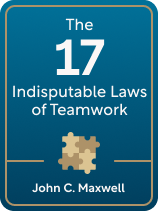

This article is an excerpt from the Shortform book guide to "The 17 Indisputable Laws of Teamwork" by John C. Maxwell. Shortform has the world's best summaries and analyses of books you should be reading.
Like this article? Sign up for a free trial here.
What are the key points in The 17 Indisputable Laws of Teamwork? What does John C. Maxwell have to say about leading and working in a team?
The 17 Indisputable Laws of Teamwork describes a winning team as one where people are in roles suited for them and have a shared identity and common goal. By looking at each piece of Maxwell’s advice, you can learn how to put together a team that works.
Here is an overview of The 17 Indisputable Laws of Teamwork with analysis.
About The 17 Indisputable Laws of Teamwork
Whether they’re winning sports championships or engineering technological breakthroughs, teams can accomplish amazing things. But why do some teams succeed when others fail? According to leadership expert John C. Maxwell, building a high-performing team requires more than getting a group of people together and hoping for the best. In The 17 Indisputable Laws of Teamwork, Maxwell provides 17 pieces of advice compiled over a lifetime of leadership research to help you recruit and organize the right people, align their efforts with a common goal, and create a positive team culture. By following Maxwell’s advice, you can raise your team to its highest potential and achieve your most ambitious goals.
Maxwell is a leadership coach, speaker, and pastor. He’s authored over 70 books, including the best-seller The 21 Irrefutable Laws of Leadership, and founded several organizations that provide leadership training, such as the John Maxwell Leadership Foundation and INJOY Stewardship Solutions.
In this article, we’ll first briefly discuss why teamwork is crucial for reaching big goals. Then, we’ll explore how you can build a winning team by assembling the right people, fostering a team identity, and cultivating strong team dynamics. Along the way, we’ll share more practical tips to help you make the most of Maxwell’s techniques and supplement his advice with other expert perspectives on leadership and teamwork.
Why Teamwork Matters
Maxwell writes that if you want to achieve great things, you need to build a team. He argues that no one can accomplish anything significant by themselves and that all remarkable achievements require team effort. This is because teams have more energy, resources, knowledge, and perspectives than an individual acting alone. They can leverage their collective strengths to overcome obstacles and innovate solutions. In other words, no matter what you aspire to do, you’ll accomplish more by having a team, whether that team is your family, church group, sports team, or colleagues.
| Overcoming the Barriers to Teamwork According to one study, less than 50% of workers enjoy working in a team, which means there’s a good chance you’re resistant to teamwork. While Maxwell doesn’t give detailed suggestions on how to overcome the four most common reasons for resisting teamwork, other experts offer advice you can consider. In Ego Is the Enemy, Ryan Holiday defines ego as a sense of superiority that causes you to view others as either a threat or someone who’s below you. To overcome a sense of ego, focus on doing something rather than being something. For instance, instead of trying to be seen as a self-reliant person, focus on the goals you want to achieve. When you do, you’ll likely realize that working with a team can help you reach them more quickly and easily. If you struggle with insecurity, practice self-compassion by being kinder to yourself when you make mistakes and focusing on accepting your true self rather than comparing yourself to other team members. In Barking Up the Wrong Tree, Eric Barker writes that self-compassion is better than confidence because it improves your performance and boosts your mood. In The 10X Rule, Grant Cardone writes that many people underestimate the effort and resources needed to reach their goal. To prevent this underestimation, multiply your expectations by 10. By doing so, you’ll likely realize the importance of having other people to provide support and resources. Finally, if you consider yourself more of an independent worker, some experts recommend you at least give working in a team a try. In The 7 Habits of Highly Effective People, Stephen R. Covey writes that collaboration is contagious. The more you work with others who share ideas openly, the more you may find it easier to collaborate and reap the benefits of teamwork. |
How to Build a Winning Team
Maxwell writes that a winning team is a group of people who unite under a common identity and who trust and support one another to achieve shared goals. In this section, we’ll discuss how to build such a team by selecting the individuals with the right skills and attitudes, creating shared visions and values, and nurturing a culture of trust and positivity.
Assemble the Right Team for Your Goal
To build a team that can achieve great things, you need to have the right people on it. Maxwell suggests you select team members based on the type of goals and challenges you face. Getting clear on what you’re trying to accomplish and what obstacles you’ll likely face will help you identify people who have the right skills, attitudes, and values for your team.
Put People in the Right Role
Maxwell writes that as you assemble your team members, you must put them each in the right role, where their strengths and talents can add the most value. When people are in a role that suits them, they feel more fulfilled, perform better, and contribute more to the team’s success.
To put people in the right role, assess the strengths and weaknesses of each member. Try to understand each person well to know what responsibilities they can excel at. Consider everything from their experience and skills to their personality and passion.
Remove People Who Hold Your Team Back
As you consider how well people are suited for their roles, you might realize that the right place for someone is simply not on your team. Sometimes, teams have weaker members who hold others back, cause problems, or lack the skills or motivation to contribute to the team’s success. Maxwell suggests you either develop weak members or remove them from the team.
Find Your Team’s Catalysts
Maxwell writes that even high-performing teams can lose steam and stop growing after some time. To keep people motivated, add a “catalyst” to your team. Catalysts are go-getters who bring energy and enthusiasm to the whole team. They inspire the team to overcome challenges and see that the necessary work gets done. According to Maxwell, once you have a team of individuals working in roles that maximize their strengths, adding a catalyst can take the team’s performance to the next level.
Recruit Support Members
Maxwell suggests you also recruit supporting members to your team. These are people who can support your team’s core members in various ways, such as by substituting, assisting, or providing resources. For example, successful sports teams have a strong bench of reserve players, software companies have testers who can support the main developers, and executives have assistants who handle administrative tasks. Recruiting support members gives your team more flexibility, allowing it to capitalize on new opportunities and overcome unexpected challenges.
Encourage Teamwork Over Self-Interest
Assembling a team of capable individuals is only the starting point, Maxwell writes. Your next step is getting team members to value the common good of the team and its goals more than their personal interests and desires. Maxwell notes that people can sometimes be tempted to seek personal glory and recognition. However, this self-interest only diminishes what the team can accomplish as a whole. He suggests several strategies to promote a collective focus among team members.
Promote a Shared Identity
Maxwell writes that one way to help people become more team-oriented is to create a shared identity that unifies your team. A shared identity gives people a sense of belonging and purpose. When everyone wants similar things and follows the same guiding principles, they’re more motivated and committed to achieving team goals rather than pursuing their own interests.
Be Willing to Make Sacrifices
Next, for a team to work well toward a collective goal, all members must be willing to make sacrifices for the team. Team members must be ready to take risks, put in the hard work to improve their skills and accomplish tasks, and sideline their personal interests for group goals. To build a team willing to make the necessary sacrifices to achieve greatness, Maxwell recommends you lead by example: Show your willingness to make sacrifices, and others will follow suit. Then, praise people who put the team before themselves.
Foster Strong Team Dynamics
To create a winning team, you must also foster strong team dynamics by improving how team members collaborate and support one another. Maxwell suggests you do this by cultivating positivity and building trust among team members.
Keep Things Positive
To enhance positivity, boost the team’s morale. A team with high morale more easily overcomes challenges, innovates, takes risks, and performs. Maxwell suggests that if your team suffers from low morale, you should identify and address the root causes of it—for example, by providing your team with more training to boost their confidence in their skills. Then, help your team members feel hopeful and believe in themselves by demonstrating your belief in them.
Build Trusting Relationships
Maxwell emphasizes that to create a strong, unified team, you must build trust among team members. Team members can only perform at their best when they know they can depend on one another.
To build trusting relationships, Maxwell suggests you foster two things within your team:
1) Reliability. According to Maxwell, team members must have five traits to be reliable: good character, the necessary skills to fulfill their responsibilities, commitment to the goal, the ability to deliver high-quality results over time, and solidarity in the face of adversity.
2) Good communication. Leaders and team members alike should talk openly and frequently with one another with honesty, respect, and vulnerability. Maxwell asserts that when teams communicate well, they can act and perform with efficiency and effectiveness.
Position Your Team for Success
Once you apply Maxwell’s advice in the previous sections, you’ll have assembled a team with the potential to reach its collective goal. Your next focus should be helping your team perform at its best. You can do this by regularly evaluating your team’s performance and encouraging team members to become leaders.
Evaluate Your Team’s Performance
According to Maxwell, to achieve its goals, a team must regularly evaluate its performance so that it can make any necessary improvements. He recommends identifying clear criteria to measure your progress. For example, a nonprofit organization might evaluate its impact based on people served, funds generated, and amount spent.
Empower People to Become Leaders
Maxwell argues that a team’s leadership is the key factor that determines whether it performs at its fullest potential and succeeds in meeting its goal. Good leaders enable their team instead of holding it back. They know how to inspire and motivate people, push their capabilities, and empower them to take on responsibilities.
Exercise: Structure Your Team for Success
To build a winning team, you must have the right people in the right roles. Reflect on your team’s needs and how you can better structure your team for success.
- Write down the goals you hope to achieve with your team. What are some potential challenges you expect to face along the way?
- What kind of people would be on your ideal team for overcoming those challenges and achieving goals? For example, you might want team members with diverse perspectives or those who are highly creative.
- How does your current team compare with your ideal team? How can you adjust your team so that it aligns more with your ideal vision? For example, you could consider changing people’s roles or letting go of some members who may be holding the team back.
- Does your team have a catalyst, or a person who energizes and inspires your team? If so, how can you encourage them to be more of a positive influence? If not, how might you start looking for one?
- What are some ways you can train and develop the supporting members of your team?

———End of Preview———
Like what you just read? Read the rest of the world's best book summary and analysis of John C. Maxwell's "The 17 Indisputable Laws of Teamwork" at Shortform.
Here's what you'll find in our full The 17 Indisputable Laws of Teamwork summary:
- Why building a high-performing team requires hard work
- Why no one can accomplish anything significant by themselves
- How to recruit and organize the right people to achieve your goal






